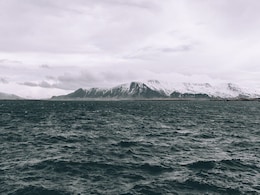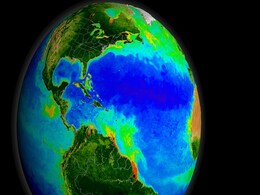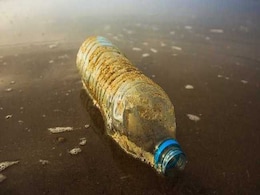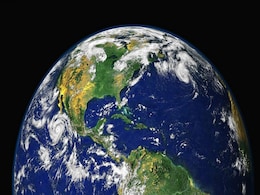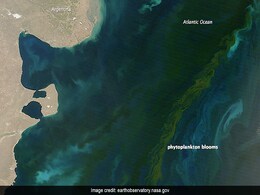Phytoplankton
- All
- News
- Web Stories
-

Chennai Beach Illuminated by Glowing Blue Waves At Night: ''Magical Show''
- Monday October 21, 2024
- Offbeat | Edited by Ritu Singh
It is a captivating natural phenomenon where chemical reactions within ocean-dwelling organisms produce mesmerising light displays.
-
 www.ndtv.com
www.ndtv.com
-

New Global Ocean Model Could Help Understand Effect of Day, Night Cycle on Global Food Web: Details
- Wednesday August 10, 2022
- Edited by Gadgets 360 Newsdesk
Phytoplankton are an important part of the food web, and are widely considered the foundation of all life on the planet. Scientists have now incporporated the day/night (diel) light cycle to understand how they get their energy at the base of the food web, in order to better understand the interactions of the rest of the global ocean food web.
-
 www.gadgets360.com
www.gadgets360.com
-

"Super-Filter" Mussels Can Clean 25 Litres Of Water A Day, Say Scientists
- Sunday August 18, 2019
- Science | Agence France-Presse
Seafood lovers who prize the mussel for its earthy taste and succulent flesh may be unaware of its growing potential in the fight against water pollution.
-
 www.ndtv.com
www.ndtv.com
-

Earth May Lose Its Blue Colour by 2100: MIT Study
- Tuesday February 5, 2019
- Indo-Asian News Service
MIT study said the blue regions, such as the subtropics, will turn shades darker, reflecting even less phytoplankton - and life in general - in those waters.
-
 www.gadgets360.com
www.gadgets360.com
-

Climate Change Will Alter The Colour Of The Oceans, New Research Finds
- Tuesday February 5, 2019
- Science | Brady Dennis, Chris Mooney, The Washington Post
By the end of the century, if not sooner, the world's oceans will be bluer and greener thanks to a warming climate, scientists reported Monday. And while the shift in color will be all but imperceptible to the human eye, it could hint at the profound changes in store for a wide array of marine life.
-
 www.ndtv.com
www.ndtv.com
-

Loss Of Ocean Oxygen To Become Widespread By 2030s: Study
- Thursday April 28, 2016
- World News | Indo-Asian News Service
There is bad news for marine life as a new study has found that loss of oxygen in oceans due to climate change which is already discernible in some parts of the world should be evident across large regions of the oceans between 2030 and 2040.
-
 www.ndtv.com
www.ndtv.com
-

Engineering Climate: From Pariah To Saviour?
- Sunday December 13, 2015
- World News | Agence France-Presse
Once dismissed as dangerous science fiction, schemes to stave off global warming by re-engineering Earth's climate may well gain in traction as a result of the Paris agreement.
-
 www.ndtv.com
www.ndtv.com
-

Global Warming Could Cause Fall in Oxygen on Earth: Study
- Wednesday December 2, 2015
- World News | Press Trust of India
Earth's oxygen could dramatically fall due to change in ocean temperature of just several degrees, which may likely result in the mass mortality of animals and humans, a new study has claimed.
-
 www.ndtv.com
www.ndtv.com
-

NASA to Study How Plants and Oceans Absorb Carbon
- Saturday November 14, 2015
- World News | Indo-Asian News Service
NASA is interested in studying how oceans and plant ecosystem take up carbon, and if the warming climate will prevent them from doing so in the future.
-
 www.ndtv.com
www.ndtv.com
-

Chennai Beach Illuminated by Glowing Blue Waves At Night: ''Magical Show''
- Monday October 21, 2024
- Offbeat | Edited by Ritu Singh
It is a captivating natural phenomenon where chemical reactions within ocean-dwelling organisms produce mesmerising light displays.
-
 www.ndtv.com
www.ndtv.com
-

New Global Ocean Model Could Help Understand Effect of Day, Night Cycle on Global Food Web: Details
- Wednesday August 10, 2022
- Edited by Gadgets 360 Newsdesk
Phytoplankton are an important part of the food web, and are widely considered the foundation of all life on the planet. Scientists have now incporporated the day/night (diel) light cycle to understand how they get their energy at the base of the food web, in order to better understand the interactions of the rest of the global ocean food web.
-
 www.gadgets360.com
www.gadgets360.com
-

"Super-Filter" Mussels Can Clean 25 Litres Of Water A Day, Say Scientists
- Sunday August 18, 2019
- Science | Agence France-Presse
Seafood lovers who prize the mussel for its earthy taste and succulent flesh may be unaware of its growing potential in the fight against water pollution.
-
 www.ndtv.com
www.ndtv.com
-

Earth May Lose Its Blue Colour by 2100: MIT Study
- Tuesday February 5, 2019
- Indo-Asian News Service
MIT study said the blue regions, such as the subtropics, will turn shades darker, reflecting even less phytoplankton - and life in general - in those waters.
-
 www.gadgets360.com
www.gadgets360.com
-

Climate Change Will Alter The Colour Of The Oceans, New Research Finds
- Tuesday February 5, 2019
- Science | Brady Dennis, Chris Mooney, The Washington Post
By the end of the century, if not sooner, the world's oceans will be bluer and greener thanks to a warming climate, scientists reported Monday. And while the shift in color will be all but imperceptible to the human eye, it could hint at the profound changes in store for a wide array of marine life.
-
 www.ndtv.com
www.ndtv.com
-

Loss Of Ocean Oxygen To Become Widespread By 2030s: Study
- Thursday April 28, 2016
- World News | Indo-Asian News Service
There is bad news for marine life as a new study has found that loss of oxygen in oceans due to climate change which is already discernible in some parts of the world should be evident across large regions of the oceans between 2030 and 2040.
-
 www.ndtv.com
www.ndtv.com
-

Engineering Climate: From Pariah To Saviour?
- Sunday December 13, 2015
- World News | Agence France-Presse
Once dismissed as dangerous science fiction, schemes to stave off global warming by re-engineering Earth's climate may well gain in traction as a result of the Paris agreement.
-
 www.ndtv.com
www.ndtv.com
-

Global Warming Could Cause Fall in Oxygen on Earth: Study
- Wednesday December 2, 2015
- World News | Press Trust of India
Earth's oxygen could dramatically fall due to change in ocean temperature of just several degrees, which may likely result in the mass mortality of animals and humans, a new study has claimed.
-
 www.ndtv.com
www.ndtv.com
-

NASA to Study How Plants and Oceans Absorb Carbon
- Saturday November 14, 2015
- World News | Indo-Asian News Service
NASA is interested in studying how oceans and plant ecosystem take up carbon, and if the warming climate will prevent them from doing so in the future.
-
 www.ndtv.com
www.ndtv.com

